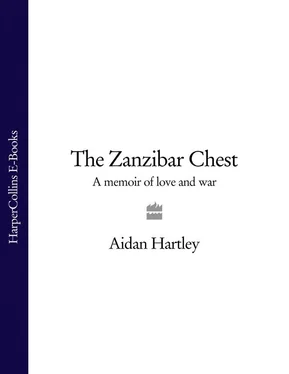1 ...7 8 9 11 12 13 ...26 She did not take much notice of him in the early days, when various other younger suitors pursued her, including a pair of pilots from RAF Eight Squadron, who each had an MG sports car. They turned up in tandem to take her to dances at the Union Club, or picnics and swimming at Gold Mohur beach. There’s a black-and-white photo of her, lissome in a black bathing suit, hands on hips, head tilted, a sly smile and laughing eyes, ankle-deep in the surf, flicking water with her dainty foot towards the camera. She looks really quite naughty in the picture, though when I joked with her about this she said primly, ‘Nonsense – we were quite proper in those days.’
My father was a very different sort of man from the dashing young British servicemen. The second time she saw him was during a polo match. He was the team’s captain but he turned up late, in dusty clothes, mounted up, yelled a lot, and rode like a Tartar. She liked the look of him. Though he liked his beer and appeared at occasional parties, he was rarely in Aden and spent most of this time in the Protectorates among the Arab farmers.
In the Secretariat, a big colonial building of arched windows, latticework and wide timber verandas, my mother used to have to sort the flow of intelligence reports for the governor. They came in from the senior political officer, Basil ‘Cloak and Dagger’ Seager, a man with a sharp nose, tight lips, pedantic rasping voice and quick, poor Arabic. He adored intrigue and by telegraph he sent messages in code or en clair in French, Latin or using obscure literary allusions that took hours to decipher. Or spies in flowing robes arrived at her office with envelopes marked CONFIDENTIAL, inside of which were smaller ones that said SECRET, inside of which were yet smaller ones that said MOST FRIGHTFULLY SECRET.
From these reports and general gossip, Mother began to notice my father’s movements. She waited for him. He didn’t appear for weeks on end. Then one day after a long time, she heard the heavy step of desert boots ascending the Secretariat’s timber stairs. Clump, clump they came down the veranda. The next day the boots were gone again. This happened several times. The months passed. She sometimes saw him on her morning rides when she went to the stables at Khormaksar. On the tennis court she found herself opposite him in a game of mixed doubles. At a party to celebrate the King’s birthday, she saw him arm in arm with the Sultan Sharif Hussein of Beihan, a magnificent figure she knew from the intelligence files, both of them standing in a flower bed and heaving with laughter at some private joke. And in her office when she heard his boots climb the stairs her heart beat faster. Clump, clump, clump. One day, my father’s face appeared at her office door.
My mother was beautiful and young, but I’ve heard it said that Dad fell in love with her when she told him that, as a girl, she had milked a cow called Bumble. He took her horse riding along the beach at Khormaksar, or east along the desert coast to the Abyan Delta where he was growing vast acres of cotton. On overnight trips to the coastal village of Zingibar she stayed with a British married couple to prevent gossip. They went riding in the desert, stopped for picnics, and he fed her polony sausage with mustard and schnapps. Odd combination, she thought. Once they got lost driving across the desert back to Aden, and he wrapped her in his sheepskin cape, waited for the clouds to clear, and navigated his way back by the stars. Mum lived at Steamer Point, Dad on the other side of the colony in the Arab village of Sheikh Othman. One day he said, ‘Let’s get married. We’ll save on petrol.’
Mum fell in love with Dad because she was a romantic. She was fascinated by stories and wanted to live out an exotic tale herself. She might not have endured as much in the years ahead had she not felt that the adventures he promised to take her on would be worth all the sacrifices she made. She was so slim my father could nearly join his hands around her waist. A Somali woman named Sara stitched her white wedding dress. A handsome RAF padre called them in for a chat and gave them a book entitled Man, Woman and God. A riding partner of Dad’s named Quill, who had been a POW in Changi, threw a stag party. On 27 January 1951 they married in the garrison church at Steamer Point with a reception to follow. Dad was forty-three, my mother twenty-five. The flowers came from Asmara by plane. The wedding cake was ordered from the Crescent Hotel. The governor laid on his Rolls-Royce to transport the bride. The telegrams were read out:
CAN NOT GET OVER NEWS STOP EMPIRE BUILDER
LOST STOP MY CONGRATULATIONS TO YOU AND
COMMISERATIONS FOR THE UNFORTUNATE WOMAN
After the English ceremony my mother changed into an Aertex shirt and slacks. They climbed into a hired car and the Arab driver got angry when he learned the guests had tied tin cans to the rear bumper. Later they drove down the beach to Abyan.
Their first night together they slept in the fort on Khanfar Rock, a promontory overlooking the whole of Abyan. After breakfast next morning, Dad told my mother to change into her riding clothes. They got on their horses; Dad on his stallion al-Qatal, my mother on al-Azraq. They rode their horses to the bottom of the rock, where the mounted Sultan Hussein al-Fadhli and his slave boy on a donkey beside him were waiting. They saw a mass of camel and horseback riders advancing towards them from the village of Zingibar, followed by a great plume of dust. Dad’s horse could sense the great crowd and stamped and snorted. The hum of many people became audible. The party rode out in a line and as they approached through clouds of dust a crowd of people on foot and on horses and camels came into view. Turbaned riders, their skin glistening with oil and blue woad, galloped towards them as they fired off salutes with rifles and muskets. ‘The bullets missed us literally by inches. I felt my hair blow up once from the blast’, Mum wrote to her parents. A circle formed and the bride and groom cantered around it as the riders shot in the air, then a cavalcade formed behind them and the whole mass of horses and camels wheeled about in the dust, horses springing and leaping. A bullock was led out into the circle and a swordsman hacked off the beast’s head. First my father, then my mother, jumped their horses over the bullock’s carcass. They dismounted and were ushered into an enormous tent lit by gas lamps. Inside, they were shown two ornate chairs where they sat, drinking glasses of tea, as a bard sang his blessings for their future together.
‘That was a good party,’ Dad said later, when they had returned to sleep on Khanfar Rock. ‘I enjoyed that,’ he said, almost surprised.
My father stopped tying himself to the bed when he grew used to living with my mother. Nor did he make his bedroll headfirst with the revolution of the earth. My eldest brother Richard was born twenty months after they married and Dad retired from service in Arabia so that they could settle and raise a family back in his beloved Africa. On the eve of sailing, my mother wrote to Granny and Grandpa: ‘If ONLY we could be certain of peace, I can see the most perfect and exciting life ahead…’
My mother’s first glimpse of Africa was a stevedore pushing a wheelbarrow of ivory tusks down the dockside in Mombasa. As he went, he chanted, ‘Produce of the Congo! Produce of the Congo!’ From the coast they drove inland to Mweiga, on the slopes of Mount Kenya, where Dad had bought the farm En’nekeraka during the Great Depression. The farmhouse was a cedar log cabin and the newlyweds would sit in their dressing gowns, in front of a roaring fire eating fresh trout from the stream. From the windows in the morning, they saw the legs of a herd of buffalo below the raising blanket of mist as they moved back into the thick surrounding forest.
Читать дальше












